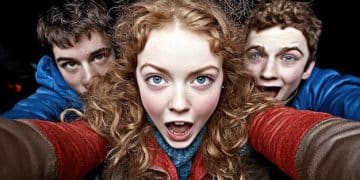How Legal Dramas Shape Jury Expectations: The Reel vs. Real Impact

How Legal Dramas Influence Jury Expectations: The portrayal of courtroom proceedings in television and film can significantly skew jurors’ perceptions of forensic evidence, witness credibility, and legal procedures, leading to unrealistic expectations during actual trials.
The intersection of entertainment and law is a fascinating, yet often concerning, subject. How Legal Dramas Influence Jury Expectations: The common perception is that what we see on screen can bleed into the real world, specifically influencing how jurors perceive and interpret courtroom events. Let’s explore how these fictional portrayals shape expectations in real-life legal settings.
The Glamorization of Legal Proceedings
Legal dramas have become a staple of television, offering viewers a front-row seat to intense courtroom battles, clever legal strategies, and shocking reveals. However, the dramatic license taken by these shows often diverges from reality, potentially setting unrealistic expectations for those who one day might sit on a jury.
Exaggerated Courtroom Dynamics
One of the most significant impacts of legal dramas is the exaggeration of courtroom dynamics. Real trials are often slow, methodical, and laden with procedural details. In contrast, television courtrooms are hotbeds of action, with attorneys delivering impassioned speeches, witnesses breaking down on the stand, and last-minute evidence dramatically changing the course of the trial.
This difference can lead jurors to expect a level of excitement that simply does not exist in real life, potentially causing them to become bored or disinterested in a legitimate case. Furthermore, the constant drama can overshadow the importance of careful deliberation and critical thinking.
The “CSI Effect” and Forensic Evidence
The “CSI effect,” named after the popular “CSI: Crime Scene Investigation” franchise, refers to the phenomenon where jurors expect forensic evidence to be readily available and highly conclusive in every case. This expectation is often fueled by the unrealistic portrayal of forensic science in television shows, where DNA evidence, fingerprints, and other forms of analysis are presented as infallible and rapidly processed.
- Unrealistic Expectations: Jurors may expect forensic evidence to be a central component of every case, even when it is not relevant or available.
- Overestimation of Technology: Legal dramas often portray forensic technology as being far more advanced and reliable than it actually is.
- Burden of Proof: Jurors might place undue weight on forensic evidence, potentially leading to wrongful convictions or acquittals.

This can place undue pressure on prosecutors, who may struggle to meet the unrealistic expectations of jurors influenced by these shows. Defense attorneys, too, must counteract these perceptions to ensure a fair trial for their clients.
In conclusion, the glamorization of legal proceedings in television dramas can create a skewed perception of reality, affecting jurors’ expectations of courtroom dynamics and the availability and reliability of forensic evidence.
Perceptions of Attorneys and Witnesses
Legal dramas not only influence perceptions of courtroom proceedings but also shape views on the individuals involved, particularly attorneys and witnesses. The way these characters are portrayed can significantly impact how jurors evaluate their credibility and competence.
The Idealized Attorney
In many legal dramas, attorneys are depicted as brilliant, charismatic, and morally upright individuals who are dedicated to seeking justice, no matter the cost. They often possess exceptional skills in cross-examination, closing arguments, and legal strategy, allowing them to outwit opposing counsel and sway the jury. However, this idealized image can lead to unrealistic expectations of real-life attorneys.
Jurors may expect attorneys to possess extraordinary abilities and may be disappointed when they encounter lawyers who are less polished or articulate. This can unfairly influence their assessment of the attorney’s competence and the strength of their case.
Witness Credibility and Demeanor
Legal dramas frequently portray witnesses as unreliable or biased, often highlighting inconsistencies in their testimony or revealing hidden motives. This can lead jurors to approach witness testimony with a high degree of skepticism, even when the witness is being truthful.
Moreover, the demeanor of witnesses can be heavily scrutinized. Dramatic portrayals often emphasize emotional reactions, body language, and tone of voice as indicators of truthfulness or deception. Jurors may place undue weight on these factors, potentially overlooking the substance of the testimony itself.
- Emotional Responses: In legal dramas, emotional responses are often exaggerated to create dramatic tension. Jurors may expect witnesses to display similar levels of emotion, even though individuals react differently under stress.
- Body Language: Body language is often presented as a clear indicator of truthfulness or deception but real-world interpretation can be complex and unreliable.
- Inconsistencies in Testimony: Legal dramas tend to magnify inconsistencies in testimony so viewers may expect witnesses to have flawless memories.

In conclusion, legal dramas can distort perceptions of attorneys and witnesses, leading jurors to expect idealized qualities and to scrutinize demeanor in ways that may not be fair or accurate. This underscores the importance of educating jurors about the realities of the legal profession and human behavior.
The Impact on Understanding Legal Procedures
One of the unintended consequences of legal dramas is their potential to misinform viewers about actual legal procedures. These shows often take liberties with the rules of evidence, courtroom etiquette, and the roles of various legal professionals, leading to a distorted understanding of how the justice system functions.
Misconceptions about Evidence
Legal dramas frequently feature dramatic revelations of evidence that would be inadmissible in a real courtroom. Hearsay, illegally obtained evidence, and evidence that lacks proper authentication are often presented as crucial to the plot, leading viewers to believe that these types of evidence are routinely admitted in trials.
Such misconceptions can lead jurors to question why certain evidence is excluded in real cases, or to assume that the absence of such evidence indicates a weakness in the prosecution’s case. This can undermine the integrity of the legal process and create challenges for attorneys who must explain the rules of evidence to jurors who may have been misled by television shows.
Distorted Views on Plea Bargaining
Plea bargaining is a common practice in the legal system, where defendants agree to plead guilty to a lesser charge in exchange for a reduced sentence. However, this process is often portrayed negatively in legal dramas, with plea bargains depicted as a sign of weakness or a way for guilty parties to escape justice. In reality, plea bargaining is a pragmatic tool used to manage caseloads and ensure efficient resolution of cases.
This negative portrayal can lead jurors to be suspicious of plea bargains, potentially causing them to view defendants who accept plea deals as inherently guilty or untrustworthy. It can also create resistance to the idea of prosecutors offering plea deals, even when it is in the best interest of justice.
Contamination of the Jury Pool
Watching these legal proceedings leads jurors to form opinions which can contaminate the jury pool by making them lean towards one side of the court due to what they may have seen previously.
In summary, legal dramas can distort understanding of legal procedures by presenting unrealistic scenarios related to evidence and making plea bargaining strategies seem nefarious. These distortions contaminate jury pools and cause jurors to be unfair.
Counteracting the Influence of Legal Dramas
Given the potential for legal dramas to influence jury expectations, it is important to proactively counteract these effects through education, voir dire, and careful case presentation.
Educating Jurors
One of the most effective ways to counteract the influence of legal dramas is to educate jurors about the realities of the legal system. This can be done through informational videos, presentations by legal professionals, and written materials that explain the rules of evidence, the roles of attorneys and witnesses, and the limitations of forensic science.
By providing jurors with accurate information, they are better equipped to distinguish between the fictional portrayals they see on television and the real-world complexities of the legal system.
Effective Voir Dire
Voir dire, the process of questioning potential jurors, is a critical opportunity to identify and address any biases or misconceptions that may have been formed as a result of watching legal dramas. Attorneys can ask targeted questions to uncover whether potential jurors have unrealistic expectations about forensic evidence, witness testimony, or courtroom procedures.
For example, attorneys might ask questions such as, “Have you ever watched legal dramas like ‘Law & Order’ or ‘CSI’?”, and “Do you believe that forensic evidence is always available and conclusive in every case?”. Based on the answers provided, attorneys can make informed decisions about which jurors to exclude from the jury.
Careful Case Presentation
Attorneys can also counteract the influence of legal dramas by carefully presenting their case in a way that is clear, concise, and grounded in reality. This means focusing on the facts, avoiding exaggerated rhetoric, and providing jurors with a solid understanding of the evidence.
- Clear Explanations: Translate complicated legal concepts into easy to understand language.
- Evidence: Provide irrefutable evidence that will stand up in court.
- Witness Testimony: Highlight truthful reliable witnesses.
Additionally, attorneys should be prepared to address any misconceptions that jurors may have about forensic science or other aspects of the legal process. This can be done by presenting expert testimony, providing visual aids, and explaining the limitations of scientific evidence.
To conclude it is vital to counterbalance the influences of legal dramas through education and strong case presentation can greatly affect real life jurors ability to be efficient throughout the courts.
The Role of Media Literacy
Media literacy, the ability to critically evaluate and analyze media messages, plays a crucial role in mitigating the influence of legal dramas on jury expectations. By teaching individuals how to distinguish between fact and fiction, media literacy empowers them to approach legal dramas with a more discerning eye.
Understanding Dramatic License
One of the key aspects of media literacy is understanding the concept of dramatic license, the practice of deviating from strict accuracy in order to enhance the entertainment value of a story. Legal dramas often employ dramatic license to create tension, suspense, and emotional impact, but this can come at the expense of realism.
By recognizing that legal dramas are primarily designed to entertain rather than educate, individuals can avoid taking their portrayals of the legal system too seriously.
Analyzing Media Messages
Media literacy also involves the ability to analyze the underlying messages and assumptions that are embedded in media content. Legal dramas often promote certain stereotypes or biases about attorneys, witnesses, and the legal system as a whole. Viewers who are media literate can recognize these biases and avoid internalizing them.
Promoting Critical Thinking
Ultimately, media literacy promotes critical thinking skills that are essential for responsible citizenship. By encouraging individuals to question, analyze, and evaluate media messages, media literacy helps them make informed decisions about their beliefs and behaviors.
Critical literacy allows for the promotion of more fair and efficient trials as critical thinkers aren’t easily mislead.
Case Studies: Real-Life Examples of Media Influence
While it can be difficult to directly attribute specific jury decisions to the influence of legal dramas, there have been several high-profile cases where the media’s portrayal of the legal system has been cited as a potential factor.
Casey Anthony Trial
The Casey Anthony trial, which involved a young mother accused of murdering her daughter, garnered intense media attention. The case lacked definitive forensic evidence, and the prosecution relied heavily on circumstantial evidence and expert testimony. However, many observers noted that jurors may have been influenced by the “CSI effect,” expecting more conclusive forensic evidence than was available. Ultimately, Anthony was acquitted of the most serious charges, a verdict that shocked many who had followed the case in the media.
O.J. Simpson Trial
The O.J. Simpson trial, which involved a former football star accused of murdering his ex-wife and her friend, was one of the most highly publicized trials in history. The case involved a complex mix of forensic evidence, witness testimony, and allegations of police misconduct. Some legal experts argued that the media’s portrayal of the case, which often emphasized the racial dynamics and the celebrity status of the defendant, may have influenced the jury’s decision to acquit Simpson.
Other Cases
There are hundreds of examples of real life media influence in court. These influences often vary case to case but the influence is always notable.
In summary, the media affects every case. By becoming more mindful of these influences a fair and efficient trial can more easily be had.
| Key Point | Brief Description |
|---|---|
| 🎬 Glamorization of Legal Proceedings | Legal dramas exaggerate courtroom dynamics and forensic evidence. |
| ⚖️ Perceptions of Attorneys and Witnesses | Legal dramas create unrealistic expectations of attorneys and witnesses. |
| 📰 Impact on Understanding Legal Procedures | Misconceptions about evidence and plea bargaining can occur. |
| 📚 Counteracting Influences | Education, voir dire, and careful presentation can help. |
Frequently Asked Questions
▼
Legal dramas can influence jury expectations by creating unrealistic perceptions of courtroom proceedings, forensic evidence, and the behavior of attorneys and witnesses.
▼
The “CSI effect” refers to jurors expecting excessive forensic evidence in every trial as television can be misleading.
▼
Jurors can be educated through informational videos, presentations by legal experts, and written materials that explain the complexities of the legal system.
▼
Media literacy involves evaluating media messages and recognizing that these messages often differ vastly from reality.
▼
Direct attribution can be very tricky but the Casey Anthony and O.J. Simpson cases show how media influence can be quite strong.
Conclusion
In conclusion, legal dramas significantly shape jury expectations by glamorizing court dynamics, skewing perceptions of forensic evidence, and distorting legal procedures. Counteracting these influences through education and media literacy is crucial for fair and impartial trials.





